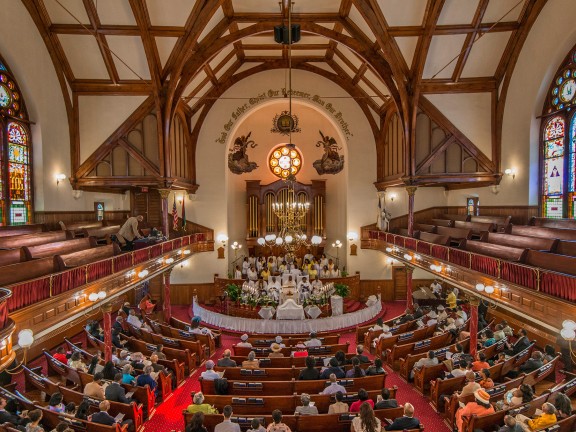Mother Bethel African Methodist Episcopal (AME) Church

This muscular Romanesque style church, erected in 1889-1890, is the fourth building on this site constructed for the African American congregation that was established in 1794. Designed by architects William S. Huckel (1858–1917) and Edward Hazlehurst (1853–1915), whose practice was best known for large suburban houses, the church stands on a parcel of land that has been owned by African Americans since 1791—longer than any other property in the United States. The story of the congregation is an important chapter in the history of African Americans.
The founding leader of Mother Bethel (“Bethel” means House of God) was Richard Allen (1760-1831) who had bought his freedom in 1780. Like many Blacks, he was drawn to the Methodist Church by its staunch opposition to slavery, and he became a preacher in St. George’s Methodist church in Philadelphia, where Absalom Jones (1846-1818) also preached. However, as the size of the free Black community in the church grew, tolerance diminished, and when Black congregants were ordered to sit only in the upper gallery Allen and Junes led the famous “Great Walkout.” (The precise date of this event is not documented; probably circa 1787-1791.)
Both Jones and Allen then worked to establish independent places of worship for African Americans. In 1787 they joined in founding the Free African Society, a benevolent organization that provided mutual aid for free Blacks in Philadelphia. The Society also held religious services, and its congregation chose to affiliate itself with the Episcopal Church, which after the Revolution had loosened its ties to the Church of England. The affiliation was formalized, Jones was chosen to provide pastoral leadership, and the African Episcopal Church of Saint Thomas was dedicated in 1794.
Allen, however, chose to remain a Methodist, and he led the effort to found Mother Bethel. In 1794 he acquired a shed that was used as a blacksmith shop and had it hauled to a site that had he had acquired three years earlier. Dedicated for use as a church in 1794, it was replaced by a more fitting structure in 1805, and it was from here that Allen built a regional network of churches that became a new denomination, the African Methodist Episcopal Church (AME). Allen was elected the organization’s first bishop.
Allen was an abolition activist, and one of his last acts was to oversee the planning of the first national convening of Black leaders, the American Society of Free Persons of Color, who met for five days in September 1830 at Mother Bethel. After his death, the church was rebuilt again, in 1841, and this third church and the tunnel that linked it to a nearby Friends meeting house are said to have been used by the Underground Railroad.
The fourth (and present) church, dedicated in 1890, is a substantial monument with an enormous auditorium, well suited for preaching and music. It was built by the vibrant African American community examined by the pioneering sociologist W.E. B. DuBois in The Philadelphia Negro (1899). The church continued to be a center of the Civil Rights movement in the twentieth century, and its effort to create a museum detailing its own history led to the 1976 establishment of the African American Museum of Philadelphia – although not on the preferred site adjacent to the church.